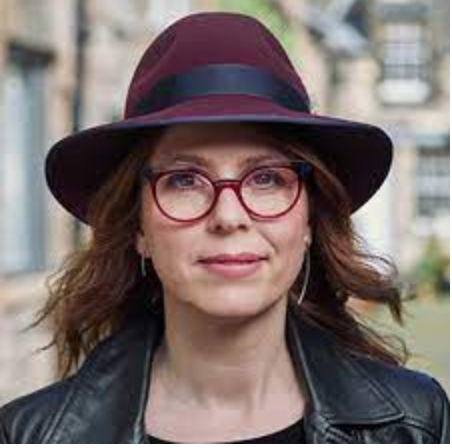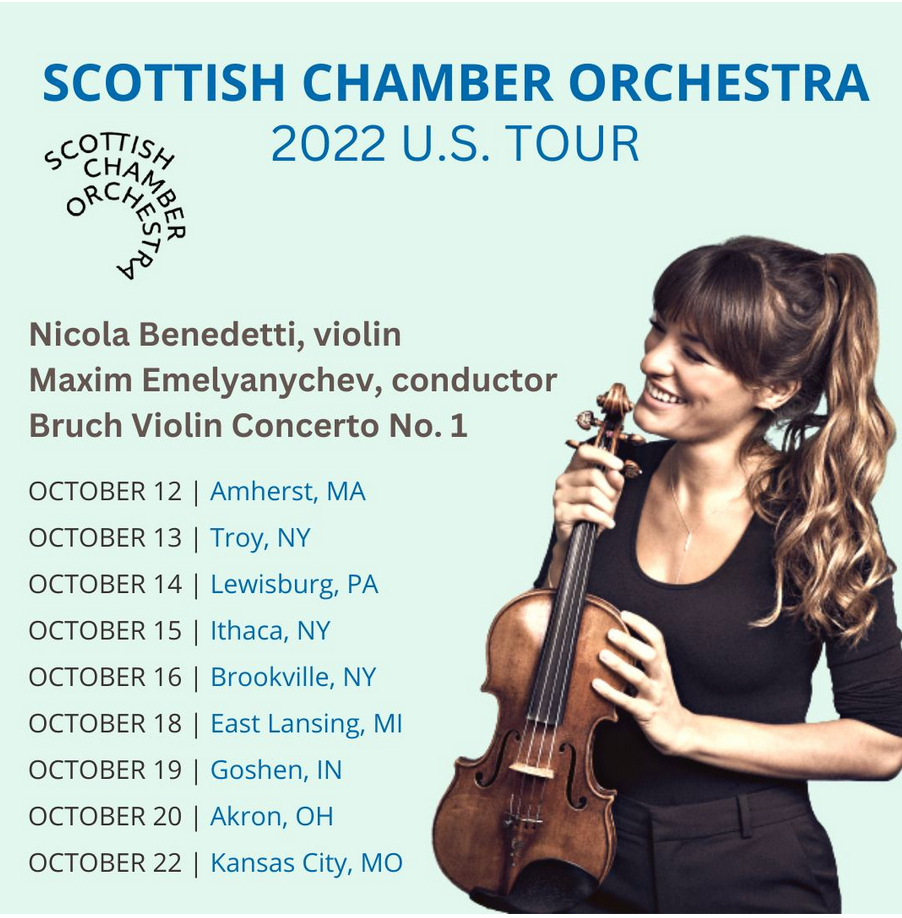by Mike Telin

A Concert Conversation between local theater aficionado Ian Haberman and Scottish Chamber Orchestra CEO Gavin Reid will begin at 6:45 pm in EJ’s Flying Balcony Club. Complimentary refreshments and wine will be provided. Tickets are available online.
Thursday’s program also includes Anna Clyne’s Stride, which is inspired by Beethoven’s Piano Sonata No. 8 in c (“Pathétique”). “I was fortunate to be the SCO’s associate composer from 2019 until 2022,” Clyne said during a recent telephone conversation. “During that time I wrote several commissions for them, one of which was Stride, so I’m very happy they picked it up for their U.S. tour.”
An eleven-minute work for string orchestra, Stride was a co-commission by the Scottish Chamber Orchestra and the Australian Chamber Orchestra. “They asked that I specifically turn to the music of Beethoven for inspiration, it being his 250th birthday back in 2020,” Clyne said, adding that the piece is the third composition in which she was asked to respond to the music of the Austrian composer. The first, Breathing Statues, draws inspiration and musical quotes from Beethoven’s String Quartets Op. 130 and 135, and the Grosse Fuge, Op. 133. The second, Shorthand for cello and string orchestra, was inspired by the “Kreutzer” Sonata. The third is Stride. “Here I was invited to find inspiration in any piece of Beethoven. Obviously there is a massive wealth of potential inspiration there,” Clyne said.
With so much music to choose from, what caused Clyne to focus on the “Pathétique” Sonata? “What I love are all of the contrasts within the piece — the melodic, harmonic, and rhythmic content which I thought would provide ample material for me to re-examine it through my own musical lens. But especially, as I write in the program note, the opening octave leaps in the left hand which are almost reminiscent of “stride” piano playing. I also thought that would be a fun way to explore the sonority of the string orchestra for which it’s composed.”
Clyne said that writing the three works gave her the opportunity to “take a nosedive” into Beethoven’s music. “He is kind of a wild composer — the Grosse Fuge is so fresh that it leaps off the page today just as it did hundreds of years ago. And I think that’s what struck me about his music — it’s still incredibly vibrant and very contemporary. And I just love his melodic contours — he created the most wonderful array of earworms — and his rhythmic invention, which is sometimes more subtle and integrated into his music, but it maintains a real freshness and playfulness to it. All of that provided a lot of inspiration for me when writing Stride.”
Born in London, Clyne began composing at the age of seven. “I played the piano and started writing pieces for myself and my friends. But my first public performance of a piece was at the age of eleven at the Oxford Youth Proms — a piece for flute and piano.”
Clyne recalled that as soon as she started to play the piano she began “noodling around” and creating her own chords and melodies. “But music is a social endeavor and that’s an aspect of it that I really love. The reward of composing music is to get to work with musicians. I’ve always been inspired by the musicians that I write for,” she said. “Whether I was an eleven-year-old writing a piece for my best friend who played the flute, or now, writing a violin concerto for Pekka Kuusisto, the connection to the musician I am writing for is a great source of inspiration.”
While Clyne has always loved writing music, she noted that she has had an “unusual trajectory” to becoming a composer. Her first composition lessons were with Marjan Mozetich when she was an exchange student at Queen’s University in Canada. “That wasn’t until my third year of undergraduate studies — and a lot of budding composers begin taking lessons much younger. But with hindsight I feel very fortunate because when I did begin to study I knew what I wanted to say, I just didn’t have all the tools. When you’re younger, you’re more influenced by your mentor’s musical language.”
Although Clyne said she never had an “I’m going to be a composer moment,” writing music is something that she has always had a “burning passion for.” She has also been fortunate to work with “some extraordinary musicians and ensembles,” such as the Scottish Chamber Orchestra, which have made for an enjoyable career.
“My first major residency was with the Chicago Symphony and most recently I’ve been composer in residence with the Philharmonia Orchestra.” Beginning next season Clyne will hold the same position with the Helsinki Philharmonic.
“They’re all very special because each orchestra has its own personality and interests.
One of the things I love about the SCO is their musicianship — their standards are incredible. And the musicians are committed to contemporary music. As an ensemble they have commissioned over 200 works so joining an organization that already has that interest makes it fertile ground for artistic conversations.”
Clyne said the Scottish Chamber Orchestra also has a fantastic education department. “When I came aboard they started a program called New Stories which is designed for three emerging, female-identifying composers. During the first year they worked on a piece for seven instruments, and during the second year they wrote a piece for chamber orchestra and I mentored them remotely via Zoom. It’s rare to have a program where composers are in place for two years. But this was a unique opportunity and it was a real delight to see these composers blossom and to gain more confidence in their skill sets. So the educational aspect for me is very compelling.”
As a woman composer, Clyne said she has been very fortunate to have had two important mentors who are women. “At university I studied with Marina Adamia, who is Georgian, and at Manhattan School of Music my mentor was Julia Wolfe. Gender is not something I thought about, I was just a composer. But there are massive shortcomings, especially in the orchestral world, and I feel that part of my role as a composer is to open opportunities for more diversity across the board. And I use these opportunities to help in any way that I can. Whether it be the New Stories program, or if I’m curating concerts, I need to be mindful that I am bringing aboard a range of exciting voices that might not ordinarily be heard. For example, the Philharmonia Orchestra has a series called the Music of Today, and the two concerts that I’ve created featured female-identifying composers.”
Winding down our conversation, I asked Clyne if she wasn’t composing would she still be a musician? “Yes,” she said. “I love creating music and I play a lot of instruments not very well. My main instrument is cello, and during the pandemic I took banjo and fiddle lessons, and obviously I play piano. But I think it’s very challenging to be a musician because you really have to practice every day, whereas with composing you can do it in waves or have some periods of time where you’re not composing and periods where you are doing it intensely. Perhaps if I put composing away I’d have more time to concentrate on playing an instrument — because there are many pieces I would love to be able to play, including the Pathétique Sonata. But without practicing that is not going to happen.”
Published on ClevelandClassical.com October 17, 2022.
Click here for a printable copy of this article




